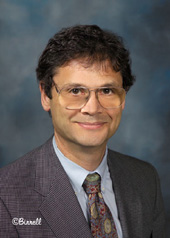 |
Stephen Rennard, M.D. |
This offers tremendous potential to help people who haven’t been able to quit smoking, the researchers said.
NicVAX® works by preventing nicotine from entering the brain, which in turn may reduce the pleasurable effects of smoking, said Dr. Rennard, Larson Professor of Medicine in the UNMC Pulmonary and Critical Care Section.
“The vaccine is really very different than all of the other drugs,” he said. “Theoretically, all the other drugs are designed to work in the person’s brain to affect the nicotine addiction process. They can do that and they can help. The vaccine targets the addicting drug and it seems more appealing to attack the enemy.”
At the American Heart Association’s annual scientific sessions on Wednesday, Dr. Rennard presented results from a 12-month study that was conducted at nine centers around the country.
|
|
The phase II clinical trial tested two dose levels of NicVAX and timing of the vaccinations.
Among those who received the highest antibody dosage, 24.6 percent achieved an 8-week period of continuous abstinence from smoking compared to 13 percent for those who received placebos.
Dr. Rennard said there was a significant relationship between anti-nicotine antibody levels and continuous abstinence from smoking.
NicVAX was well-tolerated and showed no differences in adverse events or in local/systemic reactions between placebo and each active vaccine group.
Because smoking is correlated with many serious health problems — including tripling the risk of dying from heart disease among middle-aged people — interest is high about the effectiveness of nicotine vaccines, Dr. Rennard said.